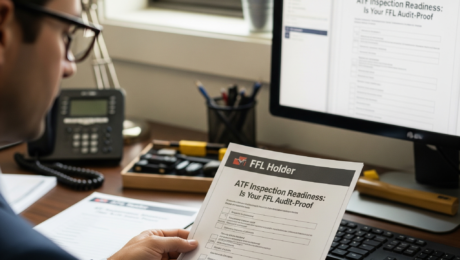For every Federal Firearms Licensee (FFL), the Acquisition & Disposition (A&D) book isn’t just a record; it’s the heartbeat of your compliance. This “bound book” is the chronological log of every firearm that enters and leaves your inventory. Historically, it was a literal paper book. Today, however, managing this critical record on paper can be a time-consuming, error-prone endeavor – a potential pitfall in the eyes of the ATF. We understand the unique challenges FFLs face and champion robust solutions designed for precision and peace of mind in compliance. Why Your A&D Book is Non-Negotiable The A&D book serves several vital purposes: Traceability: It allows the ATF to trace the ownership of firearms from manufacturer to consumer, crucial for law enforcement investigations. Accountability: It provides a clear record of every firearm in your possession, demonstrating your adherence to responsible business practices. Compliance: Accurate and timely entries are a fundamental requirement of your FFL. Errors or omissions can lead to severe penalties, including fines, suspension, or even revocation of your license. Best Practices for Maintaining Impeccable A&D Records Whether you’re currently using paper or considering a digital transition, these best practices are essential: Timely Recording: Acquisitions: Every firearm received must be entered into your A&D book immediately upon receipt. This includes purchases, consignments, gunsmithing repairs, and returns. Dispositions: Every firearm disposed of (sold, transferred, destroyed, returned to owner) must be recorded immediately upon disposition. The key is “contemporaneously” – as it happens, not at the end of the day or week. Complete and Accurate Entries: Acquisition Information: Date of acquisition, name and address of the transferor (or FFL name and license number), manufacturer, importer (if any), model, serial number, type, caliber/gauge. Disposition Information: Date of disposition, name and address of the transferee (or FFL name and license number), and the ATF Form 4473 serial number (for non-licensee transfers). No Erasures or White-Out: For paper books, corrections must be made by drawing a single line through the error, writing the correct information, and initialing/dating the change. Digital systems handle corrections with audit logs, maintaining a clear history. Managing Repairs and Consignments: Firearms taken in for repair or on consignment must be properly acquired into your A&D book. When the repaired firearm is returned to its original owner, it must be properly disposed of, often linked to the initial acquisition entry. Consigned firearms that are sold through your FFL follow the standard disposition process. Reconciliation with Physical Inventory: Regularly reconcile your A&D book with your physical inventory. This involves comparing what your book says you have to what you physically possess. Discrepancies must be investigated immediately. Unaccounted for firearms may need to be reported as lost or stolen. Reporting Lost/Stolen Firearms Within 48 Hours: This is a critical, federally mandated requirement. If a firearm is lost or stolen from your inventory, you must report it to both your local law enforcement agency and the ATF within 48 hours of discovery. A corresponding entry must be made in your A&D book, noting “stolen” or “missing,” the date of discovery, and the ATF incident number. Embrace Your Digital Guardian While paper A&D books are still permissible, the advantages of electronic solutions are undeniable. They offer automated accuracy, real-time visibility, effortless reconciliation, audit-ready reports, and secure, compliant storage. They create a streamlined workflow that saves time and minimizes stress. Don’t let your A&D book be a paper pitfall. Embrace the future of FFL compliance. Bravo Store Systems provides comprehensive inventory management and integrated A&D tracking, while E4473 empowers you with a digital solution for ATF Form 4473. Together, these systems can serve as your reliable digital guardians, helping you stay compliant and allowing you to focus on what you do best: serving your customers and growing your business.
Running a successful Federal Firearms License (FFL) business comes with significant responsibility, and one of the most crucial aspects is ensuring ongoing compliance with Bureau of Alcohol, Tobacco, Firearms and Explosives (ATF) regulations. The prospect of an ATF inspection can feel daunting, but with the right preparation and the right tools, you can move from feeling vulnerable to being confidently “audit-proof.” At E4473 and Bravo Store Systems, we understand the complexities of FFL compliance. We’ve seen firsthand how meticulous record-keeping, well-trained staff, and an inspection-ready premise are the cornerstones of a compliant and thriving business . Let’s dive into what you can expect during an ATF inspection, common pitfalls to avoid, and proactive steps to ensure your FFL is always prepared. Understanding the ATF’s Authority and the Inspection Process ATF Industry Operations Investigators (IOIs) have the authority to conduct routine compliance inspections to ensure FFLs are adhering to federal laws and regulations. These inspections are crucial for public safety and preventing firearms from falling into the wrong hands. Typically, an inspection may involve: Review of your Acquisition and Disposition (A&D) records: Ensuring all firearms received and disposed of are accurately and promptly documented. Examination of your ATF Forms 4473: Verifying proper completion, retention, and adherence to procedures for firearm transfers. Verification of your inventory: Conducting physical counts to reconcile with your A&D records. Assessment of your security measures: Evaluating your premises to prevent theft or loss of firearms. Review of your processes for reporting multiple sales, lost or stolen firearms, etc. Knowing what to expect is the first step towards preparedness. The ATF provides guidance and resources, but having systems in place to manage these requirements efficiently is paramount. Common Pitfalls That Trigger Violations While seemingly minor errors can lead to citations, some common pitfalls consistently appear in ATF inspection reports. These include: Errors on Form 4473: Missing information, incorrect dates, illegible handwriting, or improper identification verification are frequent issues. This is where E4473.com truly shines. Their digital platform streamlines the Form 4473 process, offering built-in validation rules, electronic signatures, and secure storage, significantly reducing the chances of these costly errors. Inaccurate or Incomplete A&D Records: Failing to record acquisitions or dispositions in a timely manner, missing crucial details like serial numbers, or discrepancies between physical inventory and records are major red flags. Bravo Store Systems offers a robust point-of-sale and inventory management system designed specifically for firearm retailers. Their integrated A&D tracking ensures your records are accurate, up-to-date, and easily accessible, making reconciliation a breeze. Failure to Maintain an Inspection-Ready Premise: This includes disorganized records, inadequate security measures, or an environment that doesn’t allow for efficient inspection. Proactive Steps to Ensure You’re Always Ready for an Audit Being “audit-proof” isn’t about fearing inspections; it’s about demonstrating a commitment to compliance every day. Here are proactive steps you can take: Maintain an Inspection-Ready Premise: Organize your records logically and ensure they are readily accessible. Establish a designated area for inspections where you can comfortably work with the IOI. Ensure adequate lighting and a clean environment. Review and update your security measures regularly. Understand ATF’s Authority and Regulations: Stay informed about the latest ATF rulings, guidance, and regulations. Subscribe to ATF updates and participate in industry training. Have a clear understanding of your responsibilities as an FFL. Have Key Documents Readily Available: Maintain organized files of all required federal, state, and local licenses and permits. Ensure your A&D records are up-to-date and easily searchable (digital systems like Bravo Store Systems make this seamless). Have a readily accessible system for retrieving completed ATF Forms 4473 (the secure digital storage offered by E4473 Cloud Storage.com is invaluable here). Keep records of any correspondence with the ATF. Invest in Comprehensive Staff Training: Your staff is your first line of defense in ensuring compliance. Provide thorough and ongoing training on all relevant ATF regulations and your store’s compliance procedures. Ensure everyone understands the importance of accurate record-keeping, proper Form 4473 completion, and identifying potential red flags. Regularly quiz staff on key compliance areas. E4473 & Bravo Store Systems: Your Partners in Compliance In today’s regulatory environment, relying on manual processes can leave you vulnerable. E4473 empowers you with a digital solution for ATF Form 4473, drastically reducing errors and streamlining the transfer process. Coupled with the comprehensive inventory management and integrated A&D tracking of Bravo Store Systems, you have a powerful compliance toolkit at your fingertips. By embracing these proactive steps and leveraging the efficiency and accuracy offered by solutions like E4473 and Bravo Store Systems, you can significantly enhance your ATF inspection readiness. Instead of fearing an audit, you can approach it with confidence, knowing that your commitment to compliance is evident in every aspect of your FFL business. Stay vigilant, stay informed, and stay prepared – your license depends on it!
As an FFL (Federal Firearms Licensee), managing ATF compliance is a cornerstone of your business. The ATF Form 4473, “Firearms Transaction Record,” is arguably the most critical document in this process. For years, the paper form was the only option, but with the advent of approved electronic solutions, FFLs now have a choice: stick with printable 4473s or transition to digital 4473s? Each method has its pros and cons, and understanding them is key to deciding what’s best for your operation, whether you’re a gun store, a pawn shop, or an online firearms dealer. The Traditional Route: Printable ATF Form 4473s Printable 4473s are the familiar paper forms you’ve always used. They’re physical documents that customers fill out by hand, and you store them in a secure location. Pros of Printable 4473s: No Upfront Software Cost: You typically only need to print them, either from the ATF website or a commercial supplier. Tangible Record: Some FFLs prefer the physical presence of a paper form for their records. Simple to Understand: Most staff and customers are already familiar with the paper process. Low Tech Barrier: Doesn’t require specific computer systems or internet connectivity beyond initial printing. Cons of Printable 4473s: Error Prone: Handwriting can be illegible, and manual entry increases the chance of critical errors like incorrect dates, missing signatures, or unchecked boxes, leading to potential ATF violations. Time-Consuming: Customers spend more time filling out forms, and your staff spends more time reviewing them and manually entering data into an A&D Bound Book. Storage Headaches: Paper forms require significant physical storage space, which must be secure and easily auditable. Difficult to Search/Retrieve: Finding specific forms for audits or customer inquiries can be a laborious process. Bound Book Discrepancies: Manual transcription from the 4473 to the A&D Bound Book is a common source of errors. The Modern Solution: Digital (Electronic) ATF Form 4473s Digital 4473s utilize ATF-approved electronic systems to capture, manage, and store the required transaction information. These systems often integrate directly with electronic A&D Bound Books and NICS checks. Pros of Digital 4473s: Significantly Reduced Errors: Digital forms often have built-in validation checks (e.g., ensuring all required fields are filled, validating dates, confirming selections), drastically reducing common mistakes that lead to ATF violations. Streamlined Process: Customers can complete forms faster on a tablet or computer, and data often auto-populates, saving time for both customers and staff. Automated A&D Book Entry: Many digital systems automatically transfer data directly into your electronic A&D Bound Book, eliminating manual transcription errors. Easy Storage & Retrieval: Forms are securely stored digitally, making them instantly searchable and retrievable for audits or inquiries. This saves physical space and simplifies compliance checks. Enhanced Security: Digital storage often includes robust security features, backups, and audit trails. Improved Customer Experience: A modern, efficient process reflects well on your business. Cons of Digital 4473s: Upfront Cost: Requires investment in approved software, hardware (like tablets), and potentially initial training. Technology Reliance: Requires stable internet connectivity and reliable hardware. Technical glitches, though rare with good systems, can cause temporary disruptions. Learning Curve: Staff may need training to become proficient with the new system. Which Option is Right for Your FFL? The choice between printable and digital 4473s largely depends on your business’s size, volume of transactions, comfort with technology, and budget. Printable 4473s might still suit very low-volume FFLs or those with limited tech infrastructure, where the cost savings outweigh the risks of manual errors and storage burdens. Digital 4473s are increasingly becoming the industry standard, especially for growing businesses. The investment often pays for itself through reduced errors, saved labor hours, simplified audits, and enhanced overall compliance confidence. Systems like Bravo Store Systems, for example, offer comprehensive AI-driven POS solutions that include integrated digital 4473s, automating compliance steps that paper forms simply can’t. Ultimately, the best 4473 solution is one that ensures accuracy, compliance, and efficiency for your FFL. Many FFLs find that the long-term benefits and peace of mind offered by an ATF-approved digital 4473 system far outweigh the initial investment.
For every Federal Firearms Licensee (FFL), an ATF audit can feel like a pop quiz you didn’t quite study for. The pressure to maintain impeccable records, ensure flawless compliance, and swiftly retrieve documents for an Industry Operations Investigator (IOI) is immense. Even a minor oversight on an ATF Form 4473 can lead to citations, fines, or even the dreaded revocation of your FFL. This is where digital 4473 software steps in, transforming what could be a grueling inspection into a much smoother, stress-free experience. Forget the mountains of paper, the illegible handwriting, and the frantic searches through dusty filing cabinets. The future of FFL compliance is digital, and it’s designed to make your ATF Audit Ready at all times. The Paper Predicament: Why Manual 4473s Create Audit Headaches Traditional paper Form 4473s, while once the standard, are ripe for common pitfalls that become glaring issues during an audit: Illegible Handwriting: An IOI can’t audit what they can’t read. Poor penmanship is a frequent source of compliance violations. Missing or Incomplete Fields: Human error is inevitable. Skipped questions, unchecked boxes, or missing signatures on a physical form are easy to overlook until an audit highlights them. Time-Consuming Retrieval: Imagine an IOI asking for a specific 4473 from five years ago. Sifting through binders and boxes wastes valuable time and creates a perception of disorganization. Storage Challenges: FFLs are required to retain 4473s for up to 20 years. This demands significant physical space and secure, organized storage, which can be costly and prone to environmental damage or loss. Correction Complications: Correcting errors on a paper 4473 after the fact requires specific, multi-step procedures that can be cumbersome and, if done incorrectly, lead to further violations. These issues are compounded during an audit, turning what should be a routine review into a high-stress event that drains your time and resources. The Digital Solution: How E4473.com Puts You in Control This is precisely why Ee4473.com, a cutting-edge digital 4473 software powered by Bravo Store Systems, has become an indispensable tool for modern FFLs. It’s built from the ground up to address these audit pain points, ensuring you’re always prepared. Here’s how digital 4473 software transforms your audit readiness: Guaranteed Accuracy & Error Prevention: Intelligent Forms: E4473.com features smart, guided forms with built-in logic. They prevent customers from skipping required fields and use ATF to help language to clarify questions, dramatically reducing common errors like incorrect ethnicity/race entries or actual transferee questions. Legibility Guaranteed: No more deciphering handwriting. All information is entered digitally, ensuring perfect legibility for both your staff and ATF auditors. Instantaneous Record Retrieval: Centralized Digital Storage: All your completed 4473s are securely stored in the cloud, eliminating the need for physical filing cabinets. This meets ATF Ruling 2022-1, which permits electronic storage of 4473s under specific conditions. Powerful Search Capabilities: An IOI needs a specific record? With digital software, you can search by customer name, firearm serial number, transaction date, or any other relevant field, instantly pulling up the required documents in seconds, not hours. Integrated Documents: Supplemental forms, like multiple handgun sales reports or non-immigrant alien documentation, can be digitally attached directly to the 4473, keeping all transaction-related documents together and easily accessible. Simplified Audit Process: Dedicated Audit Portal: E4473 Cloud Storage, as part of the Bravo Store Systems ecosystem, often includes a designated ATF Audit Portal. This allows your IOI to access the necessary records directly (with restricted, read-only access) from a designated workstation within your system, streamlining their review without compromising other business data. Organized for Review: Digital records are inherently organized, allowing auditors to efficiently review batches of forms, conduct traces, and verify compliance with far greater ease than sifting through physical documents. The Confidence of Compliance with Bravo Store Systems Knowing that your 4473s are 100% compliant with ATF regulations, always accessible, and securely stored provides invaluable peace of mind. E4473.com is not just a digital form; it’s a comprehensive compliance powerhouse built to simplify and secure your FFL operations. Its seamless integration within the Bravo Store Systems platform means your 4473s automatically sync with your POS, inventory, and A&D bound book, ensuring consistency across all your records. Don’t let the next ATF audit catch you off guard. Embrace the efficiency, security, and accuracy that digital 4473 software provides. Be ready, be compliant, and operate your FFL with unmatched confidence. Is your FFL truly audit-ready? Visit e4473.com today to learn how Bravo Store Systems can help you achieve stress-free ATF inspections!
The safest way to sell firearms
Schedule your FREE live demo today to see E4473 in action.
![]()





